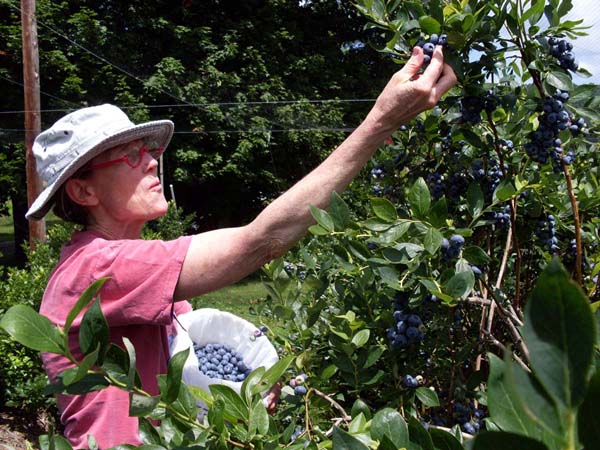The Roots Run Deep:
Berry Farming in West Virginia
By Steven Keith

White Oak Berry Farm is one of many sites in the Mountain State where fruit lovers can pick their own berries. Photo by Steven Keith.
Some of my fondest childhood memories were planted in the berry patches and fruit farms of Appalachia.
My parents would load up the station wagon with empty buckets for the drive along dirt and gravel roads, my sister and I craning our heads out the window in anticipation of that first glorious sight—soon to be followed by the sweet, sweet taste of fresh mountain-grown fruit. Rows and rows of it, as far as the eye could see, just waiting to be plucked. And sampled, of course.
My sister and I took our “quality control” jobs very seriously, tasting at least one strawberry or blueberry from every fistful—you know, just to make sure our harvest was good enough to take home.
“You’re not eating too much, are you?” Mom would ask, with a knowing grin.
“Oh no!” we’d insist. But the Technicolor blue, purple, and red stains circling our mouths said otherwise.
Hours later, we were sunburned, exhausted, and scratched to bits. Our tummies were bloated with nature’s bounty. We’d fall fast asleep on the ride home, hugging a bucket in each arm and dreaming about how soon we could go back.
These are the experiences I cherish from my childhood, which is why it’s so important to provide them to my own children now. They’ve spent joyous hours picking blueberries in Clay County, apples in Greenbrier County, and various other fruits of the land during hikes throughout our great state.
Our family fruit-picking tradition mirrors so many others throughout the hills and hollers of West Virginia, a state blessed with an abundance of farms, pick-your-own patches, farmers markets, and roadside stands bursting with juicy blueberries, strawberries, raspberries, blackberries, and more.
Places like Blueberry Hill at Flat Top in Raleigh County, The Briar Patch at Mount Hope in Fayette County, Herot Hall Farm at Kenna in Jackson County, or Orr’s Farm Market at Martinsburg in Berkeley County—just to name a few—where you can plop a ripe berry in your mouth, feel the juice dripping down your chin, and taste something almost heavenly.
For most West Virginia fruit growers, their passion for farming is rooted in deep family traditions. Mary Beth and Lester Lind of Barbour County both grew up among gardeners, albeit on opposite sides of the country. As a child in Oregon, Lester earned his spending money by picking all kinds of berries on his family’s large farm. Thousands of miles away in West Virginia, Mary Beth’s family often took “truck trips” around the state to pick any ripe berries they could find.
“Strawberries, blackberries, huckleberries, raspberries, elderberries, cranberries, it didn’t matter,” she said. “And if we picked enough wild strawberries or blackberries, Mom would make delicious homemade jam for us!”
But berry picking wasn’t just a fun activity for her family members. It was part of their livelihood. “When my father was a boy, he picked and sold strawberries to help pay for his college and medical school tuition,” she recalls. “Then later, as a country doctor, he sometimes got paid with wild berries, especially the wild huckleberries from Dolly Sods.”
Her father’s ingenuity is part of what inspired her and Lester to start farming in Randolph County in the early 1980s.
“We wanted to raise our own food and sell quality food to local markets. We started out growing a variety of vegetables and some fruits—strawberries, blackberries, and blueberries—but eventually started specializing in blueberries over time.”
Business was good, but when they moved to Barbour County around 2010, they decided to cut ties with farming. “We really thought we were done, but that didn’t last long,” she explained. “It was still in our blood, so when the opportunity presented itself, we decided to experiment with a high tunnel.”
High tunnels, or hoop houses, are unheated greenhouses that extend growing seasons by protecting crops from damaging elements like wind, storms, and heat.
“We planted red raspberries and also experimented with some Northwest berries from Lester’s Oregon roots, like boysenberries, Marion berries, and some Triple Crown blackberries.” It wasn’t long before they were hooked once again, and their Whole Life Farm in Barbour County has been going strong ever since.
“To this day, we still do all the picking ourselves and sell the fruit to farmers markets, restaurants, and grocery stores.”
You can read the rest of this article in this issue of Goldenseal, available in bookstores, libraries or direct from Goldenseal.